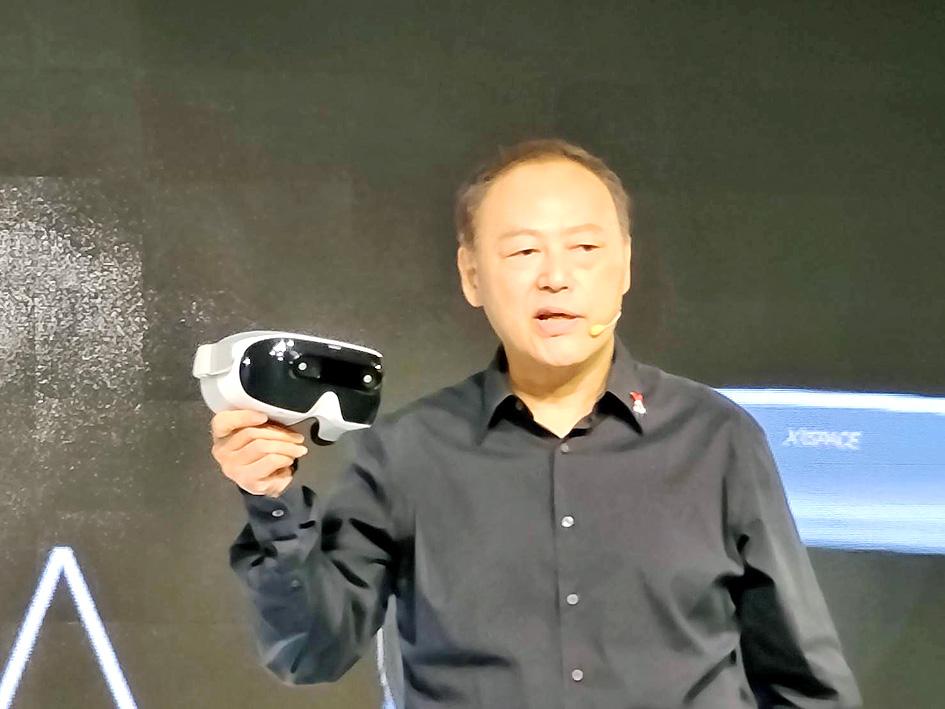XRSpace Co Ltd (未來市) in Taipei yesterday unveiled its first virtual reality (VR) headset, dubbed the XRSpace MOVA, three years after former HTC Corp (宏達電) chief executive officer Peter Chou (周永明) founded the company.
The MOVA, equipped with Qualcomm Inc’s Snapdragon 845 processor, is the world’s first VR device to support 5G technology.
While similar in design to HTC’s Vivo series, the MOVA is smaller and lighter.

Photo: Wang Yi-hung, Taipei Times
“The singular goal of XRSpace is to take extended reality (XR) to the masses by redefining how people connect, socialize and collaborate, by simplifying the hardware and user experience,” Chou said in a company statement.
“Today we are here to announce a new platform which will take human interaction to a new level through 5G XR,” Chou said.
The MOVA not only translates hand gestures into virtual world interactions, but also utilizes space scanning applications to seamlessly recreate real physical locations inside VR, the company said.
The MOVA is to be available in Taiwan in the third quarter of the year, followed by Europe, the US and China.
No retail prices have been disclosed.
Chunghwa Telecom Co (中華電信) and Taiwan Mobile Co (台灣大), and real-estate agency Evertrust Rehouse Co (永慶房屋) are partnering with XRSpace.

To many, Tatu City on the outskirts of Nairobi looks like a success. The first city entirely built by a private company to be operational in east Africa, with about 25,000 people living and working there, it accounts for about two-thirds of all foreign investment in Kenya. Its low-tax status has attracted more than 100 businesses including Heineken, coffee brand Dormans, and the biggest call-center and cold-chain transport firms in the region. However, to some local politicians, Tatu City has looked more like a target for extortion. A parade of governors have demanded land worth millions of dollars in exchange

Hong Kong authorities ramped up sales of the local dollar as the greenback’s slide threatened the foreign-exchange peg. The Hong Kong Monetary Authority (HKMA) sold a record HK$60.5 billion (US$7.8 billion) of the city’s currency, according to an alert sent on its Bloomberg page yesterday in Asia, after it tested the upper end of its trading band. That added to the HK$56.1 billion of sales versus the greenback since Friday. The rapid intervention signals efforts from the city’s authorities to limit the local currency’s moves within its HK$7.75 to HK$7.85 per US dollar trading band. Heavy sales of the local dollar by

Taiwan Semiconductor Manufacturing Co’s (TSMC, 台積電) revenue jumped 48 percent last month, underscoring how electronics firms scrambled to acquire essential components before global tariffs took effect. The main chipmaker for Apple Inc and Nvidia Corp reported monthly sales of NT$349.6 billion (US$11.6 billion). That compares with the average analysts’ estimate for a 38 percent rise in second-quarter revenue. US President Donald Trump’s trade war is prompting economists to retool GDP forecasts worldwide, casting doubt over the outlook for everything from iPhone demand to computing and datacenter construction. However, TSMC — a barometer for global tech spending given its central role in the

An Indonesian animated movie is smashing regional box office records and could be set for wider success as it prepares to open beyond the Southeast Asian archipelago’s silver screens. Jumbo — a film based on the adventures of main character, Don, a large orphaned Indonesian boy facing bullying at school — last month became the highest-grossing Southeast Asian animated film, raking in more than US$8 million. Released at the end of March to coincide with the Eid holidays after the Islamic fasting month of Ramadan, the movie has hit 8 million ticket sales, the third-highest in Indonesian cinema history, Film